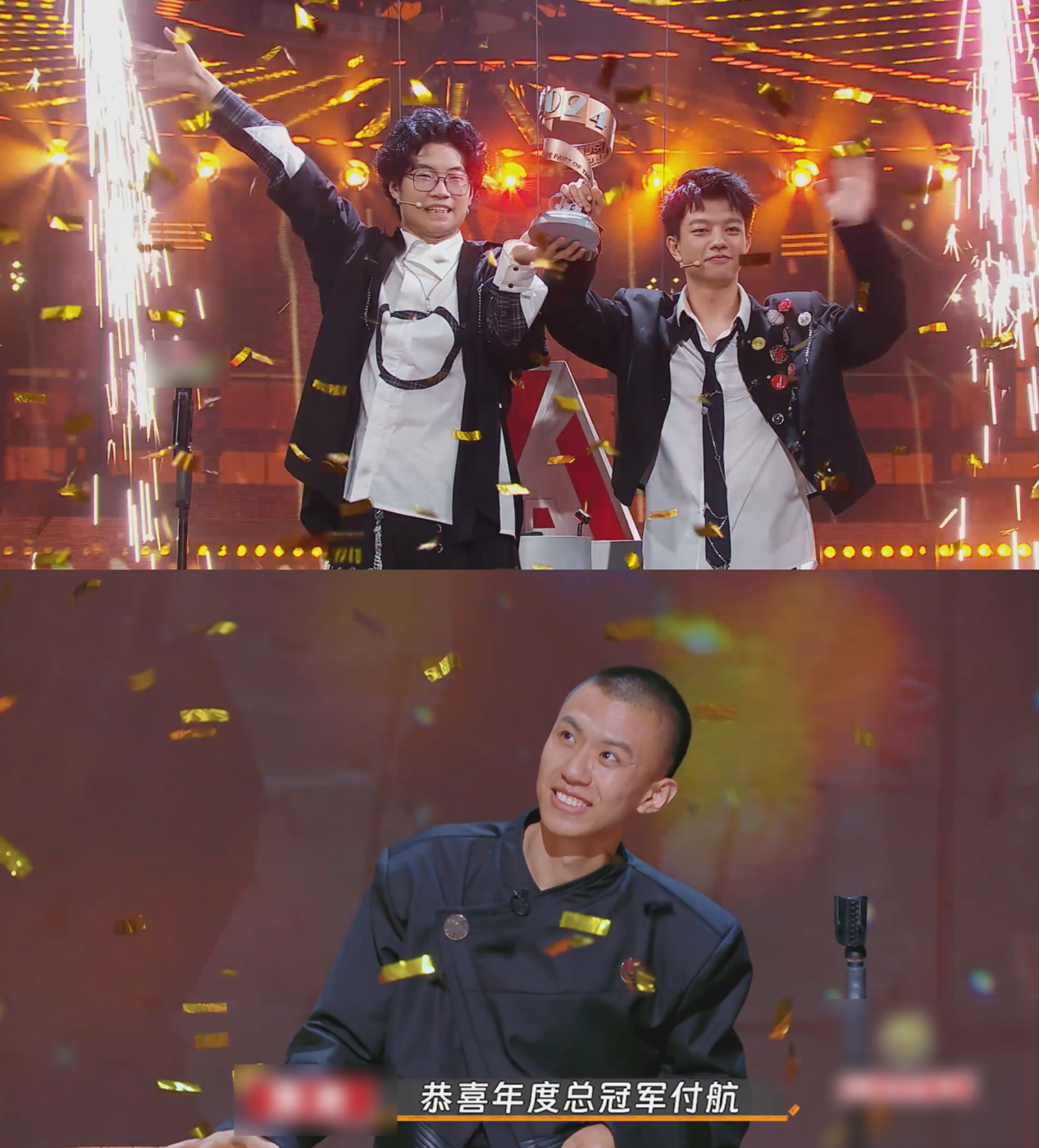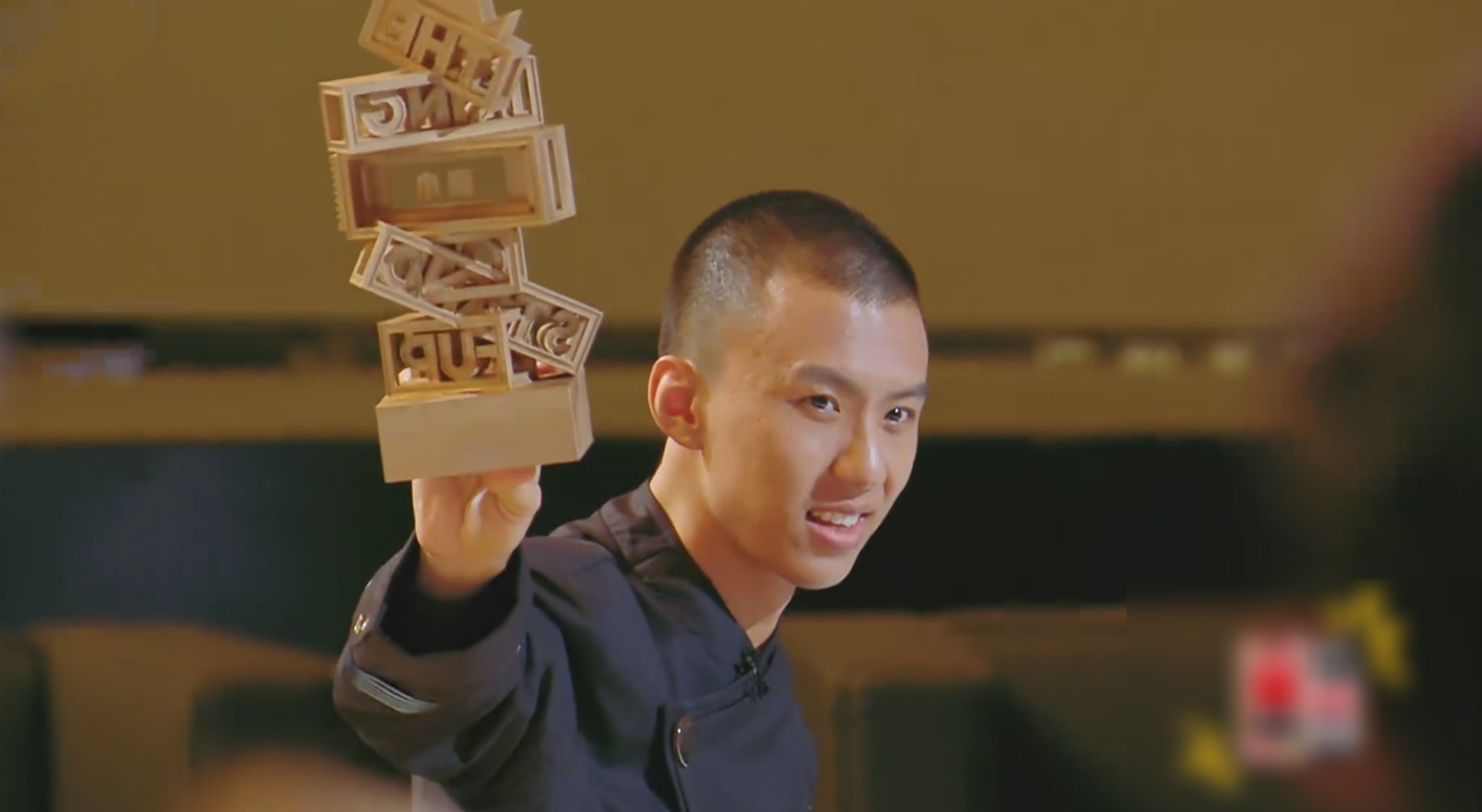
"Stand-up Comedy and Its Friends" (hereinafter referred to as "Friends") has come to an end, with the Manzai Brothers crowned champions. Four days ago, "Comedy King: Solo Season" (referred to as "Solo Season") also concluded, with Fu Hang taking the title. It's quite rare that this year has seen new talents clinching the top spots. Throughout the broadcasting period, discussions about which program is superior have been relentless, and now that both have finished, it seems we are ready to evaluate them definitively.

Manzai Brothers and Fu Hang won the championships of two programs.
Comparing which is better is not an easy task; the quality of stand-up comedy shows largely depends on the contestants' ability to create jokes and perform live. Even the same contestant may perform very differently at different times or under different circumstances; hence, one high-scoring episode could be followed by another leading to elimination. All I can say is: Some episodes of "Friends" performed better, while others of "Solo Season" were more entertaining.
Beyond the win/loss discussions, we can also be attentive to some common issues faced by both programs during their airing, which largely reflect the current ecology of the stand-up comedy industry. Clarifying these matters will help us better understand the programs and the stand-up comedy scene itself.
Unity and Division
"Friends" and "Solo Season" can be seen as a split of "Stand-up Comedy Contest." "Friends" continues to air on Tencent Video and is a revamped version of "Stand-up Comedy Contest"; "Solo Season," airing on iQIYI, features a team that has left the Laughing Culture, along with actors like Yang Li, Pang Bo, and Wang Jianguo.
Is the transition from unity to division beneficial or detrimental?
Before the stand-up comedy controversy in 2023, Laughing Culture was almost synonymous with the stand-up comedy industry in China. Founded in 2014, it was one of the earliest companies to delve into the stand-up scene, having built a large viewer base and industry experience through shows like "Roast" and "Stand-up Comedy Contest." It gradually formed a complete industry chain, encompassing everything from online variety shows to offline performances, artist management, and commercial partnerships, dominating the stand-up comedy landscape. Many newcomers consider participation in "Stand-up Comedy Contest" their first choice for entering the industry, even well-known stand-up brands like Shandiren have cooperated deeply with "Stand-up Comedy Contest," with performers like Zhou Qimo, Xiao Lu, and Heideng participating in it.
The advantage of "unity" lies in the fact that since all the top contestants have gone to "Stand-up Comedy Contest," audiences have no other stand-up shows to watch, creating a monopoly that draws all the discussion and attention, thereby enhancing its star-making ability, resulting in plenty of superstar stand-up comedians over several seasons.
However, "unity" also has its downsides. The lack of strong competitors in the market means "Stand-up Comedy Contest" lacks external pressure and stimulation, which diminishes its drive for innovation, reflected in its declining ratings. When Laughing Culture equals the industry, resource concentration makes it difficult for new and smaller comedians to gain sufficient exposure and development opportunities. When one entity dominates, any negative event or crisis facing the company or program might ripple through the entire industry; the 2023 stand-up comedy controversy proved this point.

The reputation of "Stand-up Comedy Contest" has shown a downward trend.
Thus, the shift from "unity" to "division," though an unintended outcome, is a positive development for the industry.
"Division" breaks down industry monopolies and presents a diversified competitive landscape; both programs need to continually innovate their content and discover promising new talents to attract viewers and maintain competitiveness, greatly enriching the audience experience. Moreover, "division" provides more newcomers with stages to showcase their talent—whereas they used to only squeeze into "Stand-up Comedy Contest," they now at least have another choice.
However, objectively speaking, "division" has its flaws. With two programs airing each week, each consisting of about three hours per episode, watching six or seven hours of content per week can be overwhelming. Hulan commented during the finals, "Previously, many friends watched the program secretly at work; this year, it’s like they see they haven't finished watching after work." Audiences have begun to toggle between programs according to their interests and schedules rather than focusing on a specific show, resulting in a significant drop in loyalty. Consequently, in terms of broadcast impact, the attention and popularity of both programs are not on par with the previous "Stand-up Comedy Contest."
Generally speaking, "division" is more beneficial than detrimental. However, can the two programs schedule their broadcasts to avoid overlap next year?
Old and New
A split inevitably causes a diversion among contestants. "Friends" carries the DNA of Laughing Culture, featuring more contestants from that background, with about half of the contestants being new. Here, "newcomers" refers to those who have not participated in "Stand-up Comedy Contest" before.
"Solo Season," on the other hand, faces no obligations to nurture its own artists, and excluding the four prominent veterans (Zhou Qimo, Pang Bo, Yang Li, Wang Jianguo), the proportion of newcomers can skyrocket to 80%.
Both programs emphasize nurturing newcomers. But is it better to have more newcomers? If not, what should be the ideal proportion of newcomers? This is a nuanced question.
Veteran performers contribute a stable quality to the programs. There’s a distinct difference between online and offline stages; veteran performers possess richer experience in online competition, handling joke structuring, rhythm control, and live interaction with greater ease, resulting in better on-site humor. "Friends" features quite a few seasoned comedians, many of whom have made significant progress: Dou Dou is more mature, Jia Hao has undergone a complete transformation, Bu Jingyun shows clear improvement, and Wang Defa's charm is now not limited to offline performances. Audiences take joy and comfort in witnessing the growth of veteran performers.

Dou Dou
However, having too many veteran contestants can pose risks, giving the impression of "class rigidity," making it difficult for newcomers to get sufficient exposure opportunities. Some veterans exhibit a tendency towards formulaic styles, lacking in innovation and breakthroughs, which can lessen the freshness and surprise for the audience. Even when some veteran performances are still spectacular, audience fatigue may reduce their desire for discussion. "Friends" has suffered a little from this issue.
In fact, many so-called "newcomers" in both programs are seasoned performers in offline shows with considerable experience and a solid audience base. For instance, Haha Cao is quite popular in Changsha, Fu Hang has millions of fans in short videos, and although Liu Yang is participating in an online stand-up show for the first time, his offline performances often sell out.

Newcomer Haha Cao initially received 188 votes and was criticized by some viewers as the "prince of stand-up comedy." He gradually redeemed himself in later performances.
Yet, most online viewers remain unaware of their backgrounds. When these newcomers present fresh content, unique perspectives, and distinctive performance styles, they inject new energy and vibrancy into stand-up shows, enhancing the audience's viewing experience and boosting discussions and interest on social media. For example, while "Solo Season" did not garner much attention overall, Fu Hang's explosive performance in the finals lit up social media, finally bringing the hit moment the show needed.

After the finals aired, the Douban score for "Solo Season" rose from 7.5 to 8 points.
Newcomers advancing to the finals of "Friends" included the Manzai Brothers, Shan He, and Haha Cao, filling three out of eight spots, or 37.5%. In the finals of "Solo Season," seven out of ten spots went to Yan Hexiang, Yu Xiangyu, Liu Yang, Liu Rencheng, Zhai Jianing, Xiao Luo, and Fu Hang, accounting for 70% as first-time contestants in stand-up competition shows. "Solo Season" has a higher newcomer proportion and offers audiences a greater sense of freshness.
The controversies that swept through the stand-up scene last year led to a pause in online programs, granting newcomers additional preparation time. During the two-year hiatus, many newcomers honed their craft through offline performances, accumulating a solid repertoire. When stand-up shows returned, these new talents were better prepared to withstand the scrutiny of both the programs and the audiences.
What’s curious, however, is whether there will be enough backup contestants for the second season of the program. After all, the first season has exhausted the newcomers stored over the past two years. Should the veterans from the first season be given spots out of courtesy? "Solo Season" has made its debut, but the true test lies in the second season—some might say "Friends" doesn't have this dilemma; too many personal ties have posed a challenge in this season.
If the newcomers are solid, having a higher proportion of them is a benefit; however, if they can’t hold their own, the veterans are still needed to stabilize the program’s foundation. How to balance this is yet to be seen.
Men and Women
The proportion of female contestants has increasingly become a focal point in stand-up comedy shows. The percentages of female performers in both programs are not high, with "Friends" barely exceeding 25% and "Solo Season" just surpassing 20%. However, as the shows progressed, the ratio of female contestants who advanced grew ever smaller. In "Friends," only Shan He made it to the finals, securing 7th place nationally; while in "Solo Season," Tang Xiangyu and Xiao Lu advanced to the finals, finishing 6th and 2nd respectively.

Shan He

Xiao Lu
The rise of the domestic stand-up comedy industry has long been male-dominated. This is not just sensationalism regarding gender conflicts; it is an objective truth.
In traditional gender setups, men are assigned more public expression and leadership roles, and society generally considers men to be better at telling jokes and being humorous. When stand-up comedy emerged in China, it was initially assumed to be a stage more suited for men, with audiences and practitioners exhibiting lower acceptance of female stand-up actors. Consequently, as men dominated the scene, certain norms and standards began to form regarding topics and performance styles, leaning more towards a male perspective and manner of expression.
In recent years, however, the rise of female stand-up comedians has gradually altered this reality. More women are entering the stand-up comedy realm, winning the audience’s appreciation and recognition through their unique perspectives, sharp insights, and excellent performance skills, proving that women can also be outstanding stand-up comedians and should not face any form of discrimination or limitations. This is energizing the industry and setting examples and confidence for more women professionals.
The increasing presence of women in the industry fundamentally enriches the perspectives and depth of stand-up comedy. They focus on topics closely related to women, such as menstruation, marriage pressures, childbirth, and gender stereotypes, humorously and incisively revealing the social injustices and gender biases behind these issues, showcasing strong critiques and resistance, and promoting the process of gender equality.

Cai Cai
Despite the impressive performances of female stand-up comedians in both shows, they have encountered troubles both inside and outside the programs.
On the show, they suffered from low ratings. This

